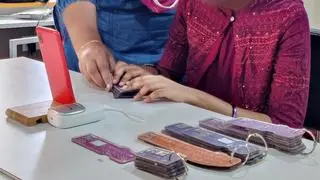Imagine boxes of Nike shoes arriving in a village in the same van, which brings Coke and Pepsi to the local retailer. Or boxed smartphones travelling alongside groceries to be offloaded at the village retailer. This is the transportation-distribution model followed by Bengaluru-based StoreKing, a company that assists villagers in making purchases online and delivers them through the local retailer.
At a time when e-commerce players are scrambling for the pie in urban areas, StoreKing has built an assisted e-commerce business in rural areas. Its founder Sridhar Gundaiah sensed an opportunity when he saw the technology boom in Bengaluru was in sharp contrast to the life villagers led just a few hundred kilometres from the IT capital. “The whole idea has been to take technology to rural India,” says Gundaiah, also the CEO of StoreKing.
The village retailer is the focal point for StoreKing, which launched operations in 2012. “We take technology to the retailer, who takes it to customers who walk in,” he says.
All that StoreKing does is to set up its kiosk with a retailer. The company puts up its tablet with an online product catalogue, from which customers choose a product. They pay to the retailer, who places the order and the item arrives within 2-3 days from StoreKing’s warehouses.
Expansion plansThe company has two of them in Bengaluru and eight more are coming up in Chennai, Kochi, Hyderabad and Hubballi. Currently, StoreKing has tied up with 27,000 retailers across 1.4 lakh villages in eight States, mostly in South India.
There are 5,000 products on StoreKing’s catalogue ranging from brands such as Samsung and Xiaomi to Godrej and Marico besides private label products.
About 30 per cent of the catalogue is FMCG, another 30 per cent is electronics while 20 per cent is home appliances and rest are generic products. Some of the most selling items are smartphones and fairness creams. “You don’t need a big catalogue for rural India. Here, selection does not matter; availability and quality matter,” he says.
That is possibly why when a girl in KM Doddi village in Karnataka ordered a Titan Raga watch through StoreKing, she came back with her friends a week later to order 20 more similar watches. And a pair of Nike shoes, bought by a college-goer at Siddapura village near Madikeri, was such a hit that the retailer got 114 more orders for similar shoes the very next day.
With StoreKing’s unique business model, which does away with last-mile delivery to customers (they pick up the product from the retailer), it has ensured profitability at an operating order level. “We piggyback on existing logistical distribution network. We don’t use courier network at all as we don’t need anyone to knock on your door,” he says.
Typically, a courier’s last mile is 60 per cent of the total cost and Gundaiah’s model does away with this expenditure. Also, since the villagers are mostly not well versed in English, ordering from sites like Amazon is something they cannot do on their own. “About 82 per cent of people in small towns can’t fill their complete address in English. Where will the product be shipped?” he asks.
That is precisely why Amazon too has tied up with StoreKing – so that the retailer can help customers buy Amazon products as well. Its catalogue integrates products of its partners as well. The company also has tie-ups with SBI, Indian Oil and Oxigen.
Growing transactionsOver the last few years, the number of transactions at StoreKing has jumped manifold. From 100 to 150 transactions per day in 2014, the number is now over 50,000, giving Gundaiah the confidence to cover the whole country soon. “We plan to be a pan-India player by 2018,” he says.
For now, the more immediate target is to cover 15 States through one lakh stores by 2017-end. And though it has raised $22 million so far from Mangrove capital and Axiata Digital, Gundaiah is in no mood to get more money.








Comments
Comments have to be in English, and in full sentences. They cannot be abusive or personal. Please abide by our community guidelines for posting your comments.
We have migrated to a new commenting platform. If you are already a registered user of TheHindu Businessline and logged in, you may continue to engage with our articles. If you do not have an account please register and login to post comments. Users can access their older comments by logging into their accounts on Vuukle.